A data marketplace, or data market, connects data providers with data consumers. This marketplace simplifies the data procurement process and supports both the monetization of data assets and the acquisition of valuable insights.
What is a Data Marketplace?
A data marketplace is an online platform for buying and selling data. It connects data providers with data consumers. This marketplace enables organizations to access external data to complement and enhance their internal data sets. Data types like business intelligence, demographic information, market research, and personal data. The marketplace for data simplifies the acquisition process, improves data quality, and promotes collaboration across industries. This ecosystem supports both the monetization of data assets and the procurement of valuable data insights.
A data marketplace is like an online store where people can buy and sell data. Data providers list their information on the platform, and buyers can find different data sets.
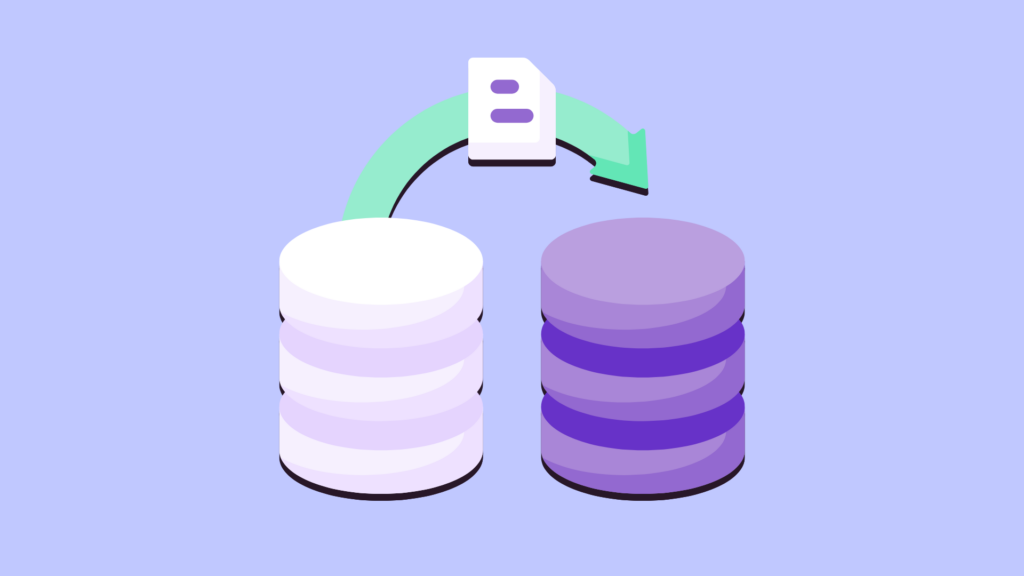
Data Marketplace Enhances Marketing Strategies
One of the benefits of a data marketplace is that it can enhance marketing strategies significantly. Users can easily discover diverse and high-quality data sets that enable more accurate targeting and personalization. A retail company can access a marketplace for data and buy detailed demographic and behavioral data on potential customers.
The company can segment its audience more effectively with this enriched information and deliver marketing messages to specific customer groups. Customization not only increases the relevance of the marketing messages but also improves the likelihood of engagement and conversion.
Besides, data marketplaces often provide access to real-time data and market trends, allowing marketers to stay ahead of changes in consumer behavior and enhance their strategies accordingly.
Key Requirements for a Data Marketplace
A successful data marketplace should meet five key requirements: an easy-to-use catalog with good search functionalities, strong security and privacy controls, high data quality, and handling large volumes of data and concurrent transactions. It should also have a user-friendly interface and integrate with other systems. So users can find, manage, and protect data well.

Data Catalog and Search Features
A data marketplace needs a simple and intuitive catalog where users can easily find and explore different datasets. The catalog should include detailed metadata for each dataset, such as descriptions, data formats, sources, and usage terms.
Search functionalities like filters and keyword searches should be available to help users quickly find relevant data. Also, the catalog should support categorization and tagging to enhance the discoverability of data assets.
Data Transactions and Privacy Controls
Security is vital in a data marketplace. The platform must protect data with strong encryption to keep it safe during transactions. Privacy controls should ensure that only authorized users can access or purchase the data. The marketplace should also follow data protection regulations, such as GDPR or CCPA to handle personal and sensitive information responsibly.
Data Quality and Integrity Assurance
Maintaining high standards of data quality and integrity is a key requirement for a data marketplace. The platform should incorporate mechanisms for verifying and validating data before it is listed for sale. This may include data profiling, consistency checks, and quality assessments. Users should also be able to rate and review datasets to provide feedback on data accuracy and reliability
Infrastructure and Performance
A data marketplace should be built on a scalable infrastructure capable of handling large volumes of data and concurrent transactions. It should have a strong and flexible infrastructure that supports quick and efficient data processing. This ensures that the platform remains fast and responsive, even as the number of datasets and users increases.
Interface and Integration
The marketplace should be easy to navigate and use, with a clean design that makes finding and managing data easy. Besides, it should offer integration with your existing systems or applications, such as through APIs or data export options. Support for APIs, data export formats, and compatibility with popular data analysis tools can enhance the usability and flexibility of the marketplace.
Top Data Marketplaces
Data marketplaces offer features like easy data sharing, real-time updates, and access to a wide range of data sets. Here’s a look at some of the top data marketplaces:
Snowflake Marketplace
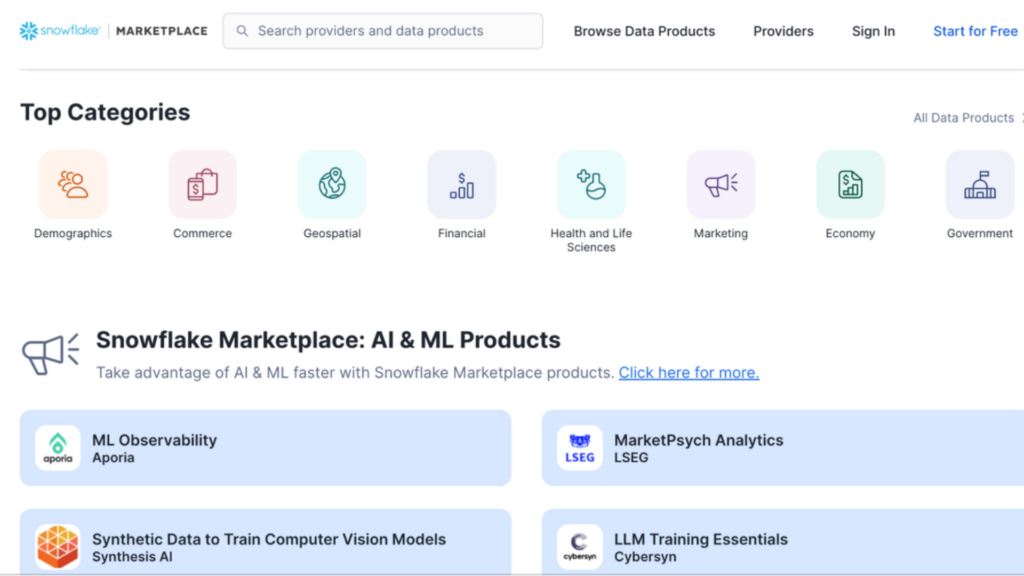
Snowflake Marketplace, a part of the AI Data Cloud, is a global data marketplace platform that simplifies the sharing, collaborating, and monetizing of datasets, services, and entire data applications.
Snowflake Marketplace connects users with over 580 providers, offering more than 2,500 data assets, applications, and AI products. This data marketplace leverages the AI Data Cloud to eliminate the need for traditional integration methods like ETL (Extract, Transform, Load), APIs, and FTP.
Built using Cross-Cloud Snowgrid and Secure Data Sharing technology, Snowflake Marketplace ensures data are immediately accessible and updated in real time. This eliminates the need to create copies of data or manage complex integrations, allowing users to work with live content directly within Snowflake.
Oracle Data Marketplace
Oracle Data Marketplace is a broad platform for global third-party data trading. Built for open and transparent data trading, the marketplace provides data attributes—over 30,000—covering many aspects of business and consumer behaviors to power targeted marketing initiatives.
Oracle Data Marketplace operates on the Data Activation System™, a widely recognized standard for data management and analytics. This system supports effective data activation and management, which ensures data can be used effectively for ad targeting and other applications.
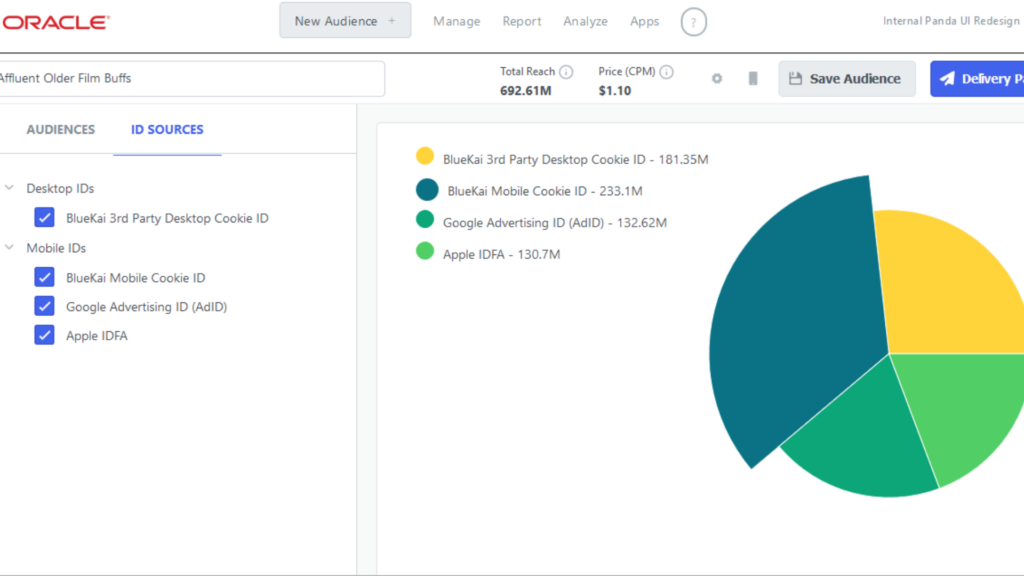
Informatica Marketplace
Informatica provides a secure data marketplace for data sharing, creating a confident data shopping experience. The platform facilitates the responsible sharing of trusted data products that drive analytics and AI initiatives.
This marketplace automates data provisioning and delivery, simplifying data request management. As part of the AI-powered Informatica Intelligent Data Management Cloud (IDMC), Informatica Data Marketplace integrates with a wide range of complementary services, like cloud data governance and cataloging, data quality and observability, and data lineage. These services enhance the overall data management capabilities and support data governance and quality practices.
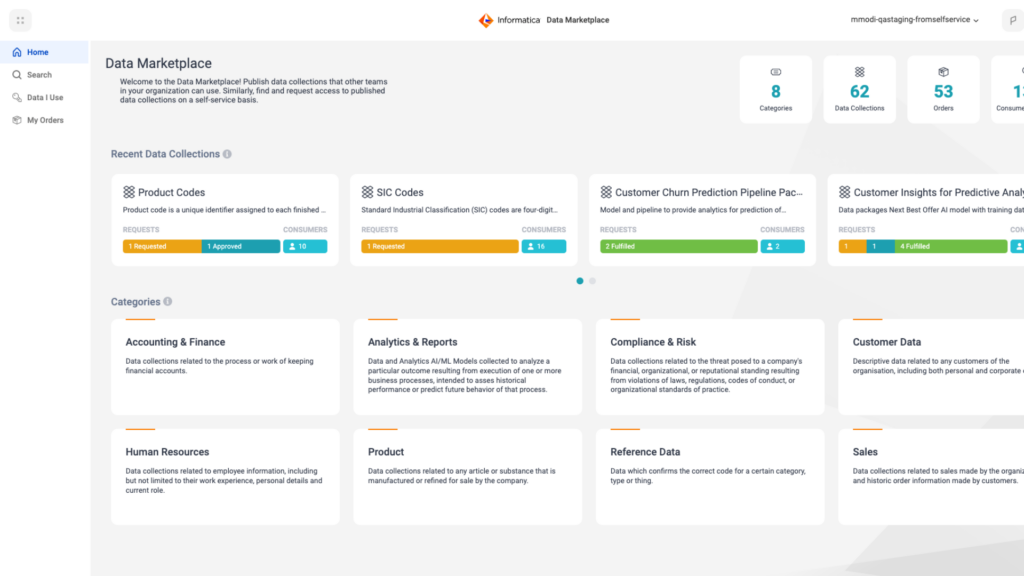
Databricks Marketplace
Powered by the open-source Delta Sharing standard, Databricks Marketplace facilitates flexible data sharing and collaboration. The marketplace eliminates the need for complex ETL processes and expensive data replication. Besides, Databricks Marketplace offers prebuilt notebooks and sample data to help users assess data products more effectively and quickly.
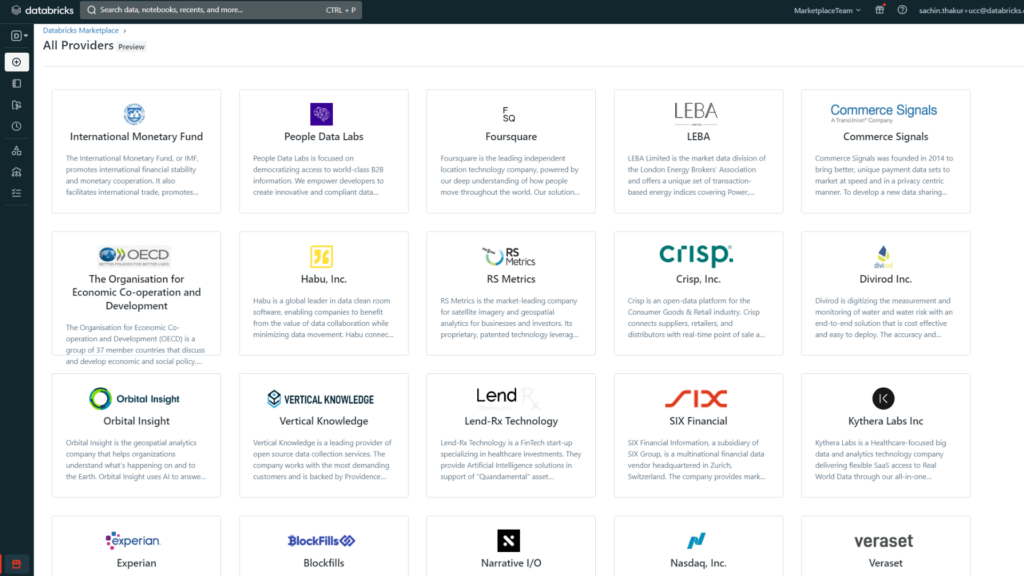
AWS Data Exchange
AWS Data Exchange is a service that enables users to find, subscribe to, and use third-party data in the AWS Cloud. This data marketplace allows organizations to easily track and manage their data grants from a central location. Data receivers can access and use AWS or partner analytics and machine learning tools to extract insights from the acquired data.
Users can also discover and use publicly available data sets through the Open Data on AWS program without an AWS account. To sell data in AWS Marketplace, providers must follow the process for listing data products, which involves product review and compliance with AWS policies.
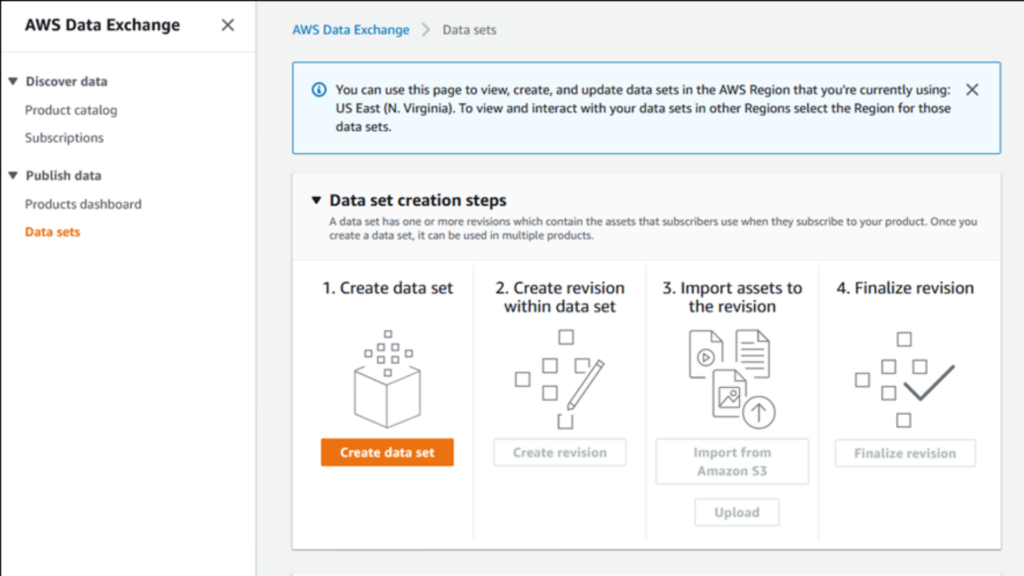
How to Build a Data Marketplace
It depends on your goal.
If you want to build an internal data-sharing marketplace,
List all your data. What’s available, where is it located, and how is it currently used? A clear inventory is useful for making informed decisions. Don’t forget about data security! Classify your data based on its sensitivity and set up strong access controls. Make sure only authorized personnel can view or share specific data. Create policies to maintain data quality and compliance.
Consider how well it integrates with your existing systems if you’re looking for an external data marketplace platform. Also, think about its usability and scalability. The top data marketplaces are Snowflake Marketplace, Oracle Data Marketplace, Informatica Marketplace, Databricks Marketplace, and AWS Data Exchange.
If you want to build a commercial data exchange marketplace,
Before you start, please make sure your marketplace complies with data protection laws and regulations. Think about developing clear terms of use and privacy policies to protect both buyers and sellers. Your data quality and formats should be standardized. This makes it easier for buyers and sellers to interact with your marketplace and enhance consistency.
Security is key when it comes to data transactions. Implement strong data encryption and secure transfer protocols to protect data from unauthorized access.
Make data pricing and monetization strategies. Will you charge a subscription fee, a pay-per-use fee, or license the data? Also, create marketing and sales plans. Finally, regularly analyze marketplace performance and transaction data. Use these insights to adapt your strategies and improve your offerings based on market trends.
Conclusion
Data marketplaces play a crucial role in modern data management. A successful data marketplace should prioritize ease of use, strong security, high data quality, and robust infrastructure. When building a marketplace for data, clear data inventory, security, compliance, and standardized quality is key to creating a successful marketplace.
(Image Credit: spotSaaS/Snowflake/Oracle/Informatica/Databricks/AWS)
Frequently Asked Questions
What is a data marketplace?
A data marketplace is an online platform where people can buy and sell data. It connects data providers with consumers, simplifying the acquisition of external data to enhance internal datasets and support data monetization.
What are examples of data marketplaces?
Top data marketplace examples include Snowflake Marketplace, Oracle Data Marketplace, Informatica Marketplace, Databricks Marketplace, and AWS Data Exchange.
What are the key features of a successful data marketplace?
A successful data marketplace should have an easy-to-use catalog, strong security and privacy controls, high data quality, scalability for handling large volumes of data, and a user-friendly interface. It should also support integration with other systems.
How to see the listing date on the data marketplace?
Looking for a page like “dataset’s details” is the easiest to see listing dates on the data marketplace. Besides, some marketplaces offer filters based on listing dates. If you can’t find the listing date, reach out to the seller directly.
Author
-

Rajat, a CFA and seasoned SpotSaaS writer, thrives at the intersection of technology and finance. Drawing from his expertise in marketing and product management, he helps users navigate the complex software landscape to find solutions that align with their business goals. By blending his deep understanding of financial decision-making with a passion for emerging technologies, Rajat crafts insightful content that empowers businesses to choose software that drives growth, efficiency, and innovation. His work bridges the gap between technical possibilities and practical business needs, making software selection a strategic advantage for his audience.
View all posts




